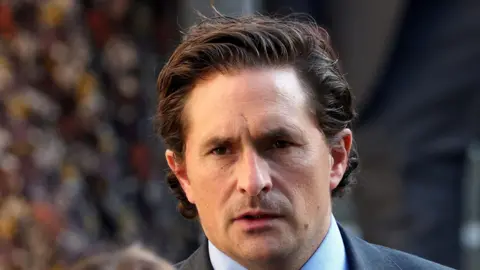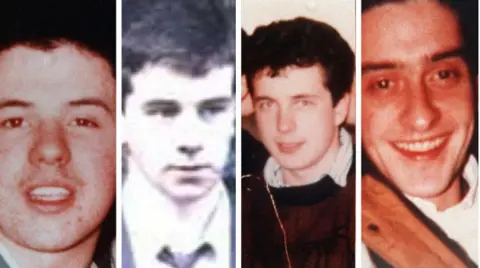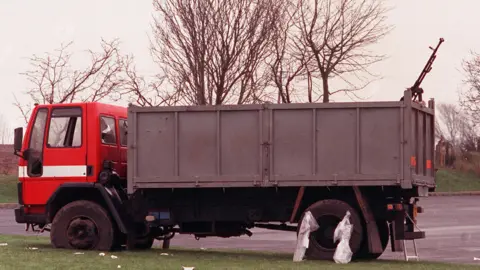Former veterans' minister says SAS shooting ruling 'a farce'
 Reuters
ReutersFormer Veterans' Minister Johnny Mercer believes an inquest ruling which said Special Air Service (SAS) soldiers were not justified in opening fire and killing a gang of IRA men, is "ridiculous" and "a farce".
Kevin Barry O'Donnell, Sean O'Farrell, Peter Clancy, and Patrick Vincent died in February 1992, minutes after they had carried out a gun attack on Coalisland police station.
On Thursday, the inquest ruling was delivered in relation to the killing of the men in the ambush in Clonoe in County Tyrone.
Sinn Féin MP for Mid Ulster Cathal Mallaghan said he believed the ruling showed a "shoot to kill policy" was enacted.
The soldiers opened fire as the men arrived at St Patrick's Church car park in a hijacked lorry which had a heavy machine gun welded to its tailgate.
Security forces had intelligence the car park would be used and 12 soldiers were in position behind a hedgerow.
Solicitors acting for their families say they are considering the verdict with regards to the possibility of prosecutions.
Solicitor - 'certainly isn't a farce'
A family lawyer of one of four IRA men killed rejected criticism from Mr Mercer.
Ronan McCourt, a solicitor for Peter Clancy's family, said that the inquest ruling "most certainly isn't a farce".
Speaking on BBC programme Talkback, he said: "I think it's very important that people that are speculating on what has been said or the findings of Mr Justice Humphrey, google the judiciary NI website.. do actually read the facts, read the rationale.. because it most certainly isn't a farce".
"It is not the opposite of fairness. It does not make the judicial system look ridiculous in any way, shape or form", he added.
NI Veterans Commissioner - 'Frustrating'
Northern Ireland's Veterans Commissioner, David Johnstone, described the ruling as "frustrating".
"I don't know any veteran who is afraid of the truth," he told BBC Radio Ulster's Evening Extra programme.
"The challenge is we effectively have a two-tier justice system", he said.
"We have a going after of those who put on the uniform with the intent of saving life and protecting property - they have to be scrutinised and yet those who went out with the intent of taking life and destroying property, as these four young men did, there's no scrutiny on them", he added.
 Family handouts
Family handoutsMercer, a former Conservative MP and veterans' minister, told BBC programme Good Morning Ulster the inquest ruling made Northern Ireland and the judicial system "look ridiculous".
"I've sat through some of these cases and it's a farce. It's really sad because it not only destroys the lives of these veterans," he said.
"At same time it doesn't provide any answers whatsoever to anybody.
"The process is a joke, it's an effort to settle scores...to rewrite the history of the Troubles and it's a hell of a lot of money for the legal participants".
"It does nothing for truth and justice."
 Pacemaker
PacemakerA 'despicable' ambush
Mark Thompson from the campaign group Relatives for Justice told Good Morning Ulster Mercer has "made a career out of defending indefensible actions of the British Army".
"The story is here that the UK government who was condemning the actions of the republicans and other organisations was engaging for itself in the very actions that it was condemning", he said.
"It [the UK government] was engaging in a pre-planned, premeditated ambush and assassination with impunity and that is despicable."
He added that it was an important day for society, the UK government, the British military and "all of these people who seek to demonise and vilify families, to reflect".
'Kill innocent people'
Democratic Unionist Party MP for East Londonderry Gregory Campbell said on Friday that the inquest ruling did not take account of the context in which the soldiers were deployed.
"Whenever these four terrorists went to Coalisland police station they went to kill innocent people - that was the reason for their mission and the coroner doesn't seem to have taken account of that context," he said.
Sinn Féin's Mallaghan said the inquest hearing "reinforces" a shoot to kill policy was enacted by the soldiers.
"For some politicians they are in denial about the role of the state and as judgements and decisions like these are issued, we now find out the evidence that in many incidents the shoot to kill was a policy used by the state," he said.
